
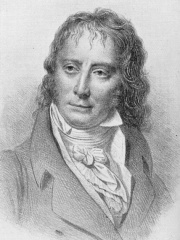
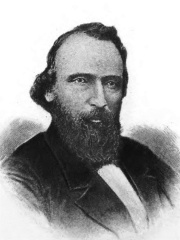

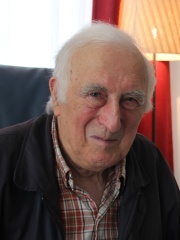
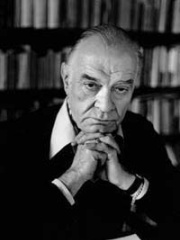
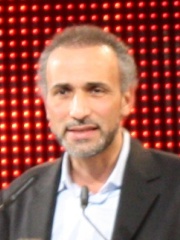
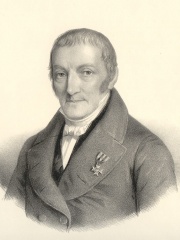
The Most Famous
PHILOSOPHERS from Switzerland
This page contains a list of the greatest Swiss Philosophers. The pantheon dataset contains 1,267 Philosophers, 9 of which were born in Switzerland. This makes Switzerland the birth place of the 26th most number of Philosophers behind Netherlands, and Libya.
Top 9
The following people are considered by Pantheon to be the most legendary Swiss Philosophers of all time. This list of famous Swiss Philosophers is sorted by HPI (Historical Popularity Index), a metric that aggregates information on a biography's online popularity.

1. Jean-Jacques Rousseau (1712 - 1778)
With an HPI of 91.27, Jean-Jacques Rousseau is the most famous Swiss Philosopher. His biography has been translated into 157 different languages on wikipedia.
Jean-Jacques Rousseau (UK: , US: ; French: [ʒɑ̃ʒak ʁuso]; 28 June 1712 – 2 July 1778) was a Genevan philosopher, philosophe, writer, and composer. His political philosophy influenced the progress of the Age of Enlightenment throughout Europe, as well as aspects of the French Revolution and the development of modern political, economic, and educational thought. Rousseau's Discourse on Inequality, which argues that private property is the source of inequality, and The Social Contract, which outlines the basis for a legitimate political order, are cornerstones in modern political and social thought. Rousseau's sentimental novel Julie, or the New Heloise (1761) was important to the development of preromanticism and romanticism in fiction. His Émile, or On Education (1762) is an educational treatise on the place of the individual in society. Rousseau's autobiographical writings—the posthumously published Confessions (completed in 1770), which initiated the modern autobiography, and the unfinished Reveries of the Solitary Walker (composed 1776–1778)—exemplified the late 18th-century "Age of Sensibility", and featured an increased focus on subjectivity and introspection that later characterized modern writing.

2. Benjamin Constant (1767 - 1830)
With an HPI of 73.28, Benjamin Constant is the 2nd most famous Swiss Philosopher. His biography has been translated into 46 different languages.
Henri-Benjamin Constant de Rebecque (25 October 1767 – 8 December 1830), or simply Benjamin Constant, was a Swiss and French political thinker, activist and writer on political theory and religion. A committed republican from 1795, Constant backed the coup d'état of 18 Fructidor (4 September 1797) and the following one on 18 Brumaire (9 November 1799). He became the leader of the Liberal opposition in 1800, during the Consulate. Having upset Napoleon and left France to go to Switzerland then to the Kingdom of Saxony, Constant nonetheless sided with him during the Hundred Days, drafting the Charter of 1815, and became politically active again during the Bourbon Restoration. He was elected to the Chamber of Deputies in 1818 and remained in office until his death in 1830. As the head of the Liberal opposition, known as Indépendants, Constant was one of the most notable orators of the Chamber as a proponent of the parliamentary system. During the July Revolution, he was a supporter of Louis Philippe I ascending the throne. Besides his numerous essays on political and religious themes, Constant also wrote on romantic love. His autobiographical Le Cahier rouge (1807) gives an account of his love for Madame de Staël, whose protégé and collaborator he became, especially in the Coppet circle, and a successful novella, Adolphe (1816), are good examples of his work on this topic. Constant was a fervent liberal of the early 19th century. He refined the concept of liberty, defining it as a condition of existence that allowed the individual to turn away interference from the state or society. His ideas influenced the Trienio Liberal movement in Spain, the Liberal Revolution of 1820 in Portugal, the Greek War of Independence, the November uprising in Poland, the Belgian Revolution, and liberalism in Brazil and Mexico.

3. Henri-Frédéric Amiel (1821 - 1881)
With an HPI of 67.51, Henri-Frédéric Amiel is the 3rd most famous Swiss Philosopher. His biography has been translated into 30 different languages.
Henri Frédéric Amiel (French: [ɑ̃ʁi fʁedeʁik amjɛl]; 27 September 1821 – 11 May 1881) was a Swiss moral philosopher, poet, and critic.

4. Emer de Vattel (1714 - 1767)
With an HPI of 64.67, Emer de Vattel is the 4th most famous Swiss Philosopher. His biography has been translated into 20 different languages.
Emmerich de Vattel (French pronunciation: [vatɛl] 25 April 1714 – 28 December 1767) was a philosopher, diplomat, and jurist. Vattel's work profoundly influenced the development of international law. He is most famous for his 1758 work The Law of Nations. This work was his claim to fame and won him enough prestige to be appointed as a councilor to the court of Frederick Augustus II of Saxony. Vattel combined naturalist legal reasoning and positivist legal reasoning.
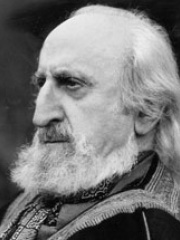
5. Frithjof Schuon (1907 - 1998)
With an HPI of 63.76, Frithjof Schuon is the 5th most famous Swiss Philosopher. His biography has been translated into 27 different languages.
Frithjof Schuon ( SHOO-on; German: [ˈfʁɪtjɔf ˈʃuːɔn]; 18 June 1907 – 5 May 1998) was a Swiss philosopher and spiritual leader, belonging to the Traditionalist School of Perennialism. He was the author of more than twenty works in French on metaphysics, spirituality, religion, anthropology and art. He was also a painter and a poet. With René Guénon and Ananda Coomaraswamy, Schuon was one of the major 20th-century representatives of the philosophia perennis. Like them, he affirmed the reality of an absolute Principle – God – from which the universe emanates, and maintained that all divine revelations, despite their differences, possess a common essence: one and the same Truth. He also shared with them the certitude that man is potentially capable of supra-rational knowledge, and undertook a sustained critique of the modern mentality severed, according to him, from its traditional roots. Following Plato, Plotinus, Adi Shankara, Meister Eckhart, Ibn Arabī and other metaphysicians, Schuon sought to affirm the metaphysical unity between the Principle and its manifestation. Initiated by Sheikh Ahmad al-Alawī into the Sufi Shādhilī order, he founded the Tarīqa Maryamiyya. His writings emphasize the universality of metaphysical doctrine, along with the necessity of practicing a religion; he also insists on the importance of the virtues and of beauty. Schuon cultivated close relationships with a large number of personages of diverse religious and spiritual horizons. He had a particular interest in the traditions of the North American Plains Indians, maintaining firm friendships with a number of their leaders and being adopted into both a Lakota Sioux tribe and the Crow tribe. Having spent a large part of his life in France and Switzerland, at the age of 73 moved to Bloomington, Indiana, where he had a community of disciples.

6. Jean Vanier (1928 - 2019)
With an HPI of 62.39, Jean Vanier is the 6th most famous Swiss Philosopher. His biography has been translated into 26 different languages.
Jean Vanier (French pronunciation: [ʒɑ̃ vanje], September 10, 1928 – May 7, 2019) was a Canadian Catholic philosopher and theologian. In 1964, he founded L'Arche, an international federation of communities spread over 37 countries for people with developmental disabilities and those who assist them. In 1971, he co-founded Faith and Light with Marie-Hélène Mathieu, which also works for people with developmental disabilities, their families, and friends in over 80 countries. He continued to live as a member of the original L'Arche community in Trosly-Breuil, France, until his death. Over the years he wrote 30 books on religion, disability, normality, success, and tolerance. Among the honours he received were the Companion of the Order of Canada (1986), Grand Officer of the National Order of Quebec (1992), French Legion of Honour (2003), Community of Christ International Peace Award (2003, later revoked), the Pacem in Terris Peace and Freedom Award (2013), and the Templeton Prize (2015). In February 2020, an internal report published by L'Arche concluded that Vanier sexually abused six women in Trosly-Breuil, France, between 1970 and 2005. The investigation was conducted by the UK-based GCPS Consulting Group.

7. Denis de Rougemont (1906 - 1985)
With an HPI of 62.27, Denis de Rougemont is the 7th most famous Swiss Philosopher. His biography has been translated into 21 different languages.
Denys Louis de Rougemont (September 8, 1906 – December 6, 1985), known as Denis de Rougemont (French: [dəni də ʁuʒmɔ̃]), was a Swiss writer and cultural theorist who wrote in French. One of the non-conformists of the 1930s, he addressed the perils of totalitarianism from a Christian point of view. After the Second World War, he promoted European federalism.

8. Tariq Ramadan (b. 1962)
With an HPI of 58.84, Tariq Ramadan is the 8th most famous Swiss Philosopher. His biography has been translated into 38 different languages.
Tariq Ramadan (Arabic: طارق رمضان, [tˤaːriq ramadˤaːn]; born 26 August 1962) is a Swiss Muslim academic, philosopher, writer and convicted rapist. He was a professor of contemporary Islamic studies at St Antony's College, Oxford and the Faculty of Theology and Religion, University of Oxford. He is a senior research fellow at Doshisha University in Japan and a visiting professor at the Université Mundiapolis in Morocco. He was a visiting professor at the Faculty of Islamic Studies at Hamad Bin Khalifa University in Qatar, and used to be the director of the Research Centre of Islamic Legislation and Ethics (CILE), based in Doha. Ramadan describes himself as a "Salafi reformist". In November 2017, Tariq Ramadan took leave of absence from Oxford to contest allegations of rape and sexual misconduct. The university's statement noted that an "agreed leave of absence implies no acceptance or presumption of guilt", and in 2021 he took early retirement from Oxford on grounds of ill health. In February 2018, he was formally charged with raping two women: a disabled woman in 2009 and a feminist activist in 2012. In September 2019, the French authorities expanded the investigation against Ramadan, already charged with raping two women, to include evidence from two more alleged victims. On 5 December 2019, a Swiss woman who had accused him of rape in 2018, launched a new case against him for slander. He was acquitted of one charge in May 2023. In September 2024 he was convicted by a Swiss court on one charge of rape. Ramadan tried to overturn the case, but his appeal was denied by Switzerland’s highest court in August 2025. His Swiss rape conviction is now final. In February 2020, Ramadan was formally charged with raping two more women and in October 2020, Ramadan was formally charged with raping a fifth woman.

9. Karl Ludwig von Haller (1768 - 1854)
With an HPI of 57.03, Karl Ludwig von Haller is the 9th most famous Swiss Philosopher. His biography has been translated into 17 different languages.
Karl Ludwig von Haller (1 August 1768 – 20 May 1854) was a Swiss jurist, statesman and political philosopher. He was the author of Restauration der Staatswissenschaft (Restoration of Political Science, 1816–1834), a book which gave its namesake to the Restoration period after the Congress of Vienna, and which Georg Wilhelm Friedrich Hegel strongly criticized in §258 of Elements of the Philosophy of Right. Von Haller's work, which was burnt during the Wartburg Festival, was a highly systematic defense both of the principles of dynastic legitimacy and monarchy founded on territorial lordship, as well as of pre-modern republics like those of the Swiss city-states, and considered one of the most consistent rejection of modern political ideas of the social contract, public law, and state sovereignty.
People
Pantheon has 9 people classified as Swiss philosophers born between 1712 and 1962. Of these 9, 1 (11.11%) of them are still alive today. The most famous living Swiss philosophers include Tariq Ramadan. The most famous deceased Swiss philosophers include Jean-Jacques Rousseau, Benjamin Constant, and Henri-Frédéric Amiel.
Living Swiss Philosophers
Go to all RankingsDeceased Swiss Philosophers
Go to all RankingsJean-Jacques Rousseau
1712 - 1778
HPI: 91.27
Benjamin Constant
1767 - 1830
HPI: 73.28
Henri-Frédéric Amiel
1821 - 1881
HPI: 67.51
Emer de Vattel
1714 - 1767
HPI: 64.67
Frithjof Schuon
1907 - 1998
HPI: 63.76
Jean Vanier
1928 - 2019
HPI: 62.39
Denis de Rougemont
1906 - 1985
HPI: 62.27
Karl Ludwig von Haller
1768 - 1854
HPI: 57.03
Overlapping Lives
Which Philosophers were alive at the same time? This visualization shows the lifespans of the 8 most globally memorable Philosophers since 1700.

